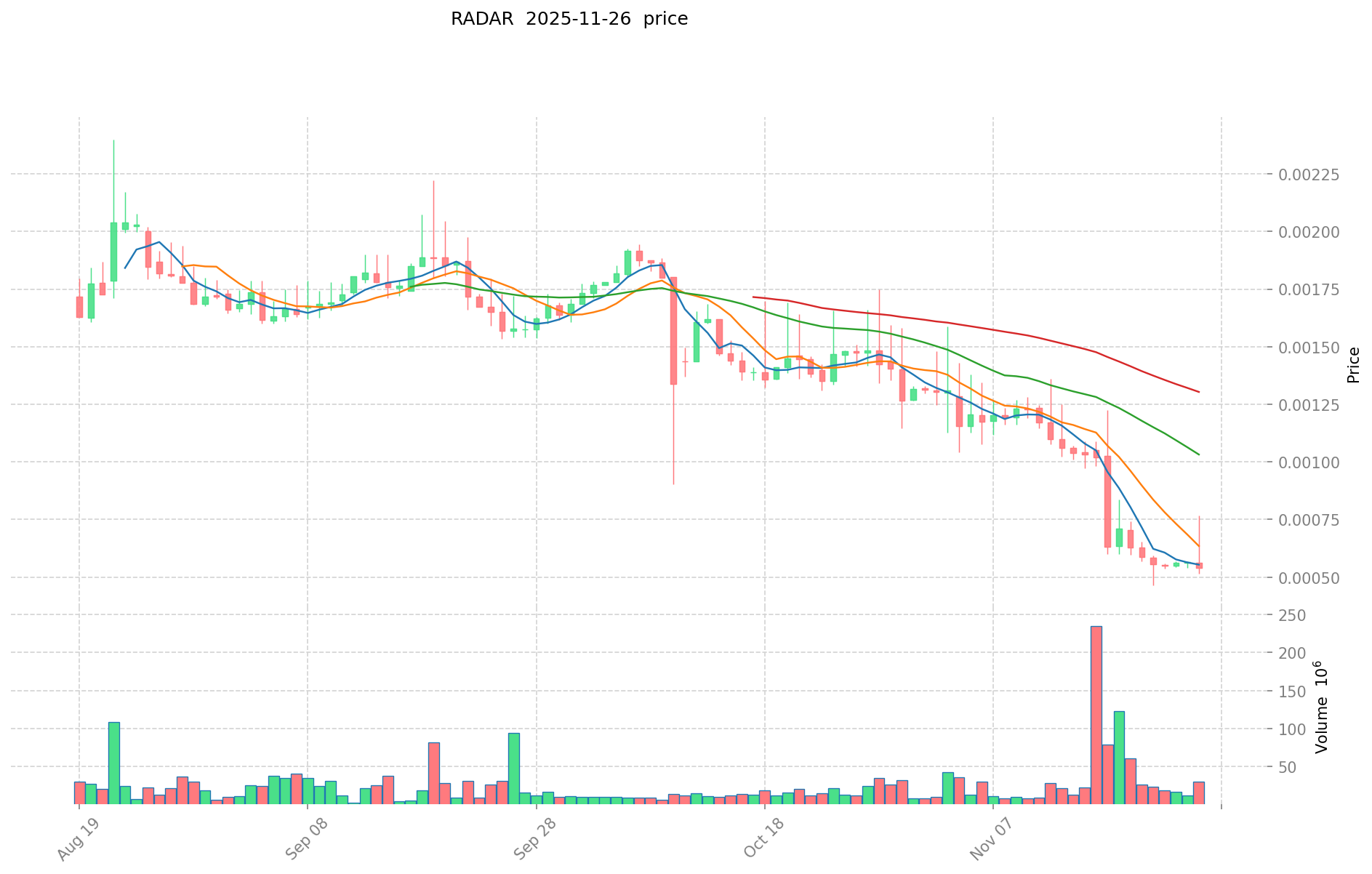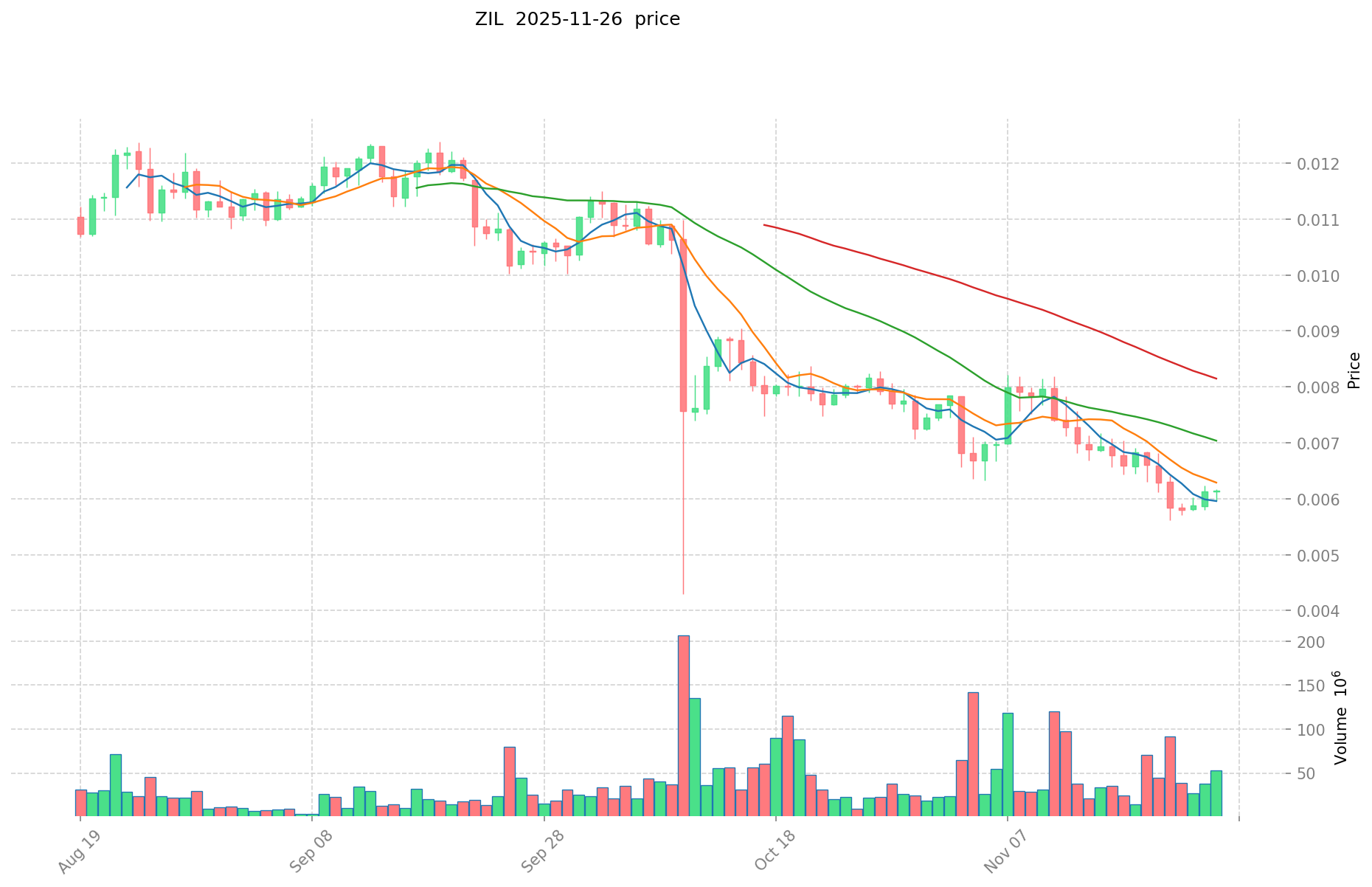RADAR vs ZIL: Comparing Two Advanced Vehicle Detection Technologies for Smart Traffic Management
Introduction: RADAR vs ZIL Investment Comparison
In the cryptocurrency market, the comparison between DappRadar (RADAR) vs Zilliqa (ZIL) has always been a topic that investors cannot avoid. The two not only show significant differences in market cap ranking, application scenarios, and price performance, but also represent different positions in crypto assets.
DappRadar (RADAR): Since its launch, it has gained market recognition for its role as the world's Dapp store, tracking and ranking decentralized applications across all protocols and vertical domains.
Zilliqa (ZIL): Since its inception, it has been hailed as a high-throughput public blockchain platform, aiming to solve transaction speed and scalability issues in current blockchain technology.
This article will comprehensively analyze the investment value comparison between RADAR and ZIL, focusing on historical price trends, supply mechanisms, institutional adoption, technological ecosystems, and future predictions, attempting to answer the question investors care about most:
"Which is the better buy right now?"
I. Price History Comparison and Current Market Status
RADAR (Coin A) and ZIL (Coin B) Historical Price Trends
- 2021: RADAR reached its all-time high of $0.057067 due to the crypto bull market.
- 2021: ZIL hit its all-time high of $0.255376 in May, influenced by the overall crypto market surge.
- Comparative analysis: During the recent bear market, RADAR dropped from its high to a low of $0.00052953, while ZIL declined from its peak to $0.00239616.
Current Market Situation (2025-11-26)
- RADAR current price: $0.0005376
- ZIL current price: $0.006092
- 24-hour trading volume: RADAR $19,463.89 vs ZIL $278,650.32
- Market Sentiment Index (Fear & Greed Index): 20 (Extreme Fear)
Click to view real-time prices:
- Check RADAR current price Market Price
- Check ZIL current price Market Price


Investment Value Core Factors: RADAR vs ZIL
I. RADAR Investment Value Core Factors
Technology Advancement
- RADAR technology remains at the core of strategic investments for fighter jets, bombers, AWAC, drones/UCAVs, and maritime patrol platforms
- Significant contracts such as the $300 million F-16 RADAR modernization project demonstrate substantial market value
- PESA (Passive Electronically Scanned Array) represents the second largest market segment in 2024
Growth Drivers
- Technical advancements and cost reduction through processes like SiGe BiCMOS have lowered 77 GHz radar costs, enabling applications across vehicle segments
- Expanded applications beyond traditional defense sectors into commercial markets
- Asset value is primarily determined by the remaining assets if a DAO decides to terminate operations
Market Positioning
- Frost Radar evaluates companies based on both absolute revenue and growth rate
- Performance assessment combines multiple factors to evaluate company performance on the growth index
- Market positioning is strengthened through strategic partnerships and ecosystem development
II. ZIL Investment Value Core Factors
Technology Infrastructure
- The reference materials do not provide specific information about ZIL's technical infrastructure or core value proposition
- Without adequate information about ZIL's specific technological advantages, a proper comparison cannot be made
Market Applications
- No specific data is provided in the reference materials about ZIL's market applications or adoption metrics
- The available information does not detail ZIL's unique selling points or competitive advantages in the market
Investment Potential
- Insufficient information is available to assess ZIL's investment value based on the provided reference materials
- No concrete data points exist in the provided context to evaluate ZIL's market position, adoption rate, or growth trajectory
III. 2025-2030 Price Prediction: RADAR vs ZIL
Short-term Prediction (2025)
- RADAR: Conservative $0.000394 - $0.000540 | Optimistic $0.000540 - $0.000762
- ZIL: Conservative $0.005598 - $0.006085 | Optimistic $0.006085 - $0.007302
Mid-term Prediction (2027)
- RADAR may enter a growth phase, with estimated price range $0.000484 - $0.000977
- ZIL may enter a steady growth phase, with estimated price range $0.005623 - $0.009418
- Key drivers: Institutional capital inflow, ETFs, ecosystem development
Long-term Prediction (2030)
- RADAR: Base scenario $0.000955 - $0.001179 | Optimistic scenario $0.001179 - $0.001214
- ZIL: Base scenario $0.008698 - $0.010608 | Optimistic scenario $0.010608 - $0.012623
Disclaimer: The above predictions are based on historical data and market analysis. Cryptocurrency markets are highly volatile and subject to various unpredictable factors. These projections should not be considered as financial advice. Always conduct your own research before making investment decisions.
RADAR:
| 年份 | 预测最高价 | 预测平均价格 | 预测最低价 | 涨跌幅 |
|---|---|---|---|---|
| 2025 | 0.000761682 | 0.0005402 | 0.000394346 | 0 |
| 2026 | 0.00093735504 | 0.000650941 | 0.00062490336 | 21 |
| 2027 | 0.0009768020646 | 0.00079414802 | 0.0004844302922 | 47 |
| 2028 | 0.001071424801183 | 0.0008854750423 | 0.000593268278341 | 64 |
| 2029 | 0.001379614389655 | 0.000978449921741 | 0.000518578458522 | 82 |
| 2030 | 0.001214403120369 | 0.001179032155698 | 0.000955016046115 | 119 |
ZIL:
| 年份 | 预测最高价 | 预测平均价格 | 预测最低价 | 涨跌幅 |
|---|---|---|---|---|
| 2025 | 0.007302 | 0.006085 | 0.0055982 | 0 |
| 2026 | 0.00736285 | 0.0066935 | 0.00468545 | 9 |
| 2027 | 0.0094177545 | 0.007028175 | 0.00562254 | 15 |
| 2028 | 0.0094564094625 | 0.00822296475 | 0.00789404616 | 34 |
| 2029 | 0.01237556194875 | 0.00883968710625 | 0.007867321524562 | 45 |
| 2030 | 0.012623073187725 | 0.0106076245275 | 0.00869825211255 | 74 |
IV. Investment Strategy Comparison: RADAR vs ZIL
Long-term vs Short-term Investment Strategy
- RADAR: Suitable for investors focused on dApp analytics and ecosystem potential
- ZIL: Suitable for investors interested in blockchain scalability solutions
Risk Management and Asset Allocation
- Conservative investors: RADAR: 30% vs ZIL: 70%
- Aggressive investors: RADAR: 60% vs ZIL: 40%
- Hedging tools: Stablecoin allocation, options, cross-currency portfolios
V. Potential Risk Comparison
Market Risk
- RADAR: Limited market recognition and adoption of dApp analytics platforms
- ZIL: High competition in the blockchain scalability sector
Technical Risk
- RADAR: Platform scalability, network stability
- ZIL: Network security, potential vulnerabilities in sharding implementation
Regulatory Risk
- Global regulatory policies may impact both tokens differently, with potential scrutiny on dApp analytics and blockchain infrastructure projects
VI. Conclusion: Which Is the Better Buy?
📌 Investment Value Summary:
- RADAR advantages: Unique position in dApp analytics, potential for ecosystem growth
- ZIL advantages: Focus on blockchain scalability, established presence in the market
✅ Investment Advice:
- New investors: Consider a balanced approach with a slight preference for ZIL due to its more established market presence
- Experienced investors: Explore opportunities in both, with a higher allocation to RADAR for potential growth
- Institutional investors: Conduct thorough due diligence on both projects, considering RADAR for its niche market and ZIL for its technological advancements
⚠️ Risk Warning: The cryptocurrency market is highly volatile, and this article does not constitute investment advice. None
VII. FAQ
Q1: What are the main differences between RADAR and ZIL? A: RADAR is focused on dApp analytics and ecosystem development, while ZIL is primarily concerned with blockchain scalability solutions. RADAR has a smaller market cap and trading volume compared to ZIL, but offers unique potential in the dApp analytics sector.
Q2: Which token has shown better price performance historically? A: Based on the provided data, ZIL has shown better historical price performance. ZIL reached an all-time high of $0.255376 in May 2021, while RADAR's all-time high was $0.057067. However, both tokens experienced significant drops during the bear market.
Q3: What are the key investment risks for RADAR and ZIL? A: For RADAR, key risks include limited market recognition and potential scalability issues. For ZIL, major risks involve high competition in the blockchain scalability sector and potential vulnerabilities in sharding implementation. Both face regulatory risks as global policies evolve.
Q4: How do the 2030 price predictions compare for RADAR and ZIL? A: The 2030 base scenario prediction for RADAR is $0.000955 - $0.001179, while for ZIL it's $0.008698 - $0.010608. In optimistic scenarios, RADAR is predicted to reach $0.001179 - $0.001214, and ZIL $0.010608 - $0.012623.
Q5: What factors should investors consider when choosing between RADAR and ZIL? A: Investors should consider their risk tolerance, investment horizon, and interest in specific blockchain sectors. RADAR may appeal to those interested in dApp analytics and ecosystem potential, while ZIL might attract investors focused on blockchain scalability solutions. Market cap, trading volume, and technological advancements should also be factored in.
Q6: How might asset allocation differ for conservative vs. aggressive investors? A: Conservative investors might consider allocating 30% to RADAR and 70% to ZIL, while aggressive investors might opt for 60% RADAR and 40% ZIL. However, these are general suggestions and should be adjusted based on individual risk profiles and market conditions.
Share
Content